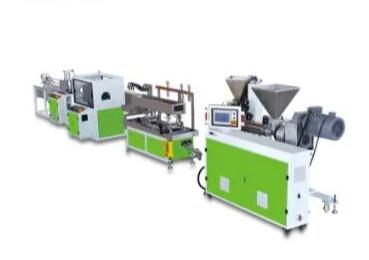How does plastic machinery contribute to recycling and sustainability efforts in the plastics industry
2023-10-30
Plastic machinery plays a significant role in advancing recycling and sustainability efforts in the plastics industry. It contributes to reducing plastic waste, conserving resources, and promoting a more environmentally responsible approach to plastic production. Here's how plastic machinery supports recycling and sustainability in the plastics industry:
1. Plastic Recycling Machinery: Specialized recycling machinery is designed to collect, sort, clean, and process plastic waste. Recycling equipment includes shredders, granulators, pelletizers, and washing lines. These machines are instrumental in transforming post-consumer and post-industrial plastic waste into reusable materials.
2. Material Recovery: Plastic recycling machinery separates different types of plastics by resin type, color, and form. This allows for the efficient recovery of materials, including PET, HDPE, LDPE, and more. It minimizes the need for new virgin plastics and reduces the environmental impact of plastic production.
3. Regranulation and Pelletization: Recycling machinery can turn shredded plastic waste into high-quality plastic pellets. These pellets can be used in various manufacturing processes, including injection molding and extrusion, to create new products.
4. Reduced Energy Consumption: Using recycled plastic materials in the manufacturing process often requires less energy compared to using virgin plastics. This energy efficiency contributes to reducing the overall carbon footprint of plastic production.
5. Environmental Impact Reduction: By reusing and recycling plastic materials, plastic machinery helps reduce the environmental impact of plastic waste, including decreasing the volume of plastic sent to landfills and minimizing marine pollution.
6. Resource Conservation: Recycling plastic materials conserves natural resources, such as petroleum, which is a primary feedstock for the production of virgin plastics. This supports the sustainable use of resources and reduces the need for oil extraction.
7. Circular Economy: The use of plastic recycling machinery promotes the principles of a circular economy, where plastics are recycled and reused, extending their lifecycle and minimizing waste.
8. Regulatory Compliance: Plastic machinery helps industries comply with environmental regulations and sustainability goals, as many regions and countries require or encourage plastic recycling and sustainable practices.
9. Sustainable Product Design: The availability of recycled plastic materials, thanks to recycling machinery, encourages manufacturers to incorporate recycled content into their products, contributing to more sustainable and eco-friendly product design.
10. Consumer Demand: An increasing number of consumers are looking for eco-friendly products made with recycled plastics, and recycling machinery helps meet this demand by providing a source of recycled material for production.
Overall, plastic machinery contributes to recycling and sustainability in the plastics industry by enabling the efficient processing of plastic waste, the creation of high-quality recycled materials, and the reduction of waste and resource consumption. These efforts support a more sustainable and environmentally responsible approach to plastics production and utilization.



